![]() In this article, you’ll find my list of the 7 best books that every facilitator (or anyone who runs workshops or meetings) should read.
In this article, you’ll find my list of the 7 best books that every facilitator (or anyone who runs workshops or meetings) should read.
These books have had a big impact on the way I approach facilitation, helping me design and run more engaging, productive, and meaningful sessions. Whether you’re new to facilitating workshops or looking to sharpen your facilitation skills, my selection of books should give you some relevant techniques and tools to lead great workshops.
Let’s dive in!
What to look for in a book about workshop facilitation
Facilitation is all about helping a group collaborate and make some progress together that each individual couldn’t have achieved on their own.
Being a good facilitator requires a unique set of skills—managing group dynamics, keeping discussions productive, and fostering creativity and engagement. Over the years, I’ve discovered several books that have helped me improve these facilitation skills, and I’m excited to share them with you. While hands-on experience is essential, there’s some valuable knowledge you can gain from reading these books.
For me, the best books on facilitation should offer more than just theory—they should be practical and adaptable. Here’s what I look for:
- Actionable Techniques: Books that provide clear, step-by-step facilitation methods you can easily use in your sessions. The most helpful ones include techniques, workshop exercises, and templates that go beyond theory.
- Real-World Examples: Stories from actual facilitators show how different techniques play out in real-life situations, giving you a better understanding of how to apply them.
- Focus on Engagement: Keeping participants engaged is a challenge for any facilitator. I value books that provide ways to manage the participants’ energy and their engagement level.
- Adaptability: The best books give tips that can be adjusted for different settings, group sizes, and objectives. Flexibility is key when you are facilitating a workshop.
With these criteria in mind, I’ve put together a list of the 7 best facilitation books.
Go deeper: Discover some of my public speaking tips for facilitators that will help you present to your audience with confidence
My selection of best books about workshop facilitation
Each book on this list has something valuable to offer, whether it’s a method to design better workshops, creative ways to foster collaboration, or ideas for keeping everyone engaged and energized.
Let’s explore these books and see how they can help you take your facilitation skills to the next level!
1. The Workshop Book: How to Design and Lead Successful Workshops by Pamela Hamilton
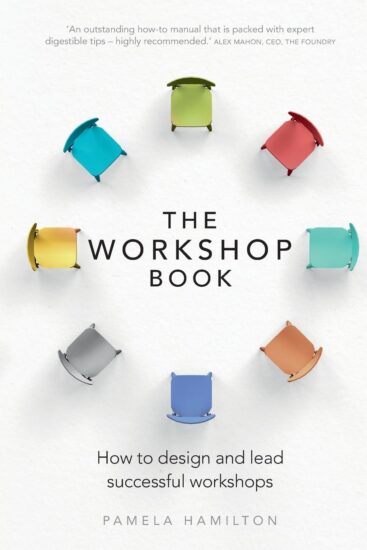
Pamela Hamilton’s The Workshop Book is an excellent resource for facilitators running workshops. The book provides detailed step-by-step plans to guide you from workshop start to finish, along with practical exercises and techniques for group facilitation. This is my go-to resource when preparing workshops that require creative problem-solving.
I’ve read a lot of books on facilitation, and this one stands out. It’s packed with detailed insights and clear guidance. Whether you’re new to facilitation or experienced, this book offers valuable insights to elevate your workshops.
Three Takeaways from The Workshop Book:
- Planning Drives Success: Hamilton lays out a step-by-step guide to ensure that workshop planning is done correctly.
- Managing Group Dynamics: Learn how to handle different personalities and group dynamics to foster collaboration.
- Ready-to-Use Exercises: The book includes a lot of resources and exercises to help structure your workshops effectively.
A Key Message from The Workshop Book:
“Workshops are a powerful tool for change. But without careful planning, they can quickly derail.”
2. Facilitator’s Guide to Participatory Decision-Making by Sam Kaner
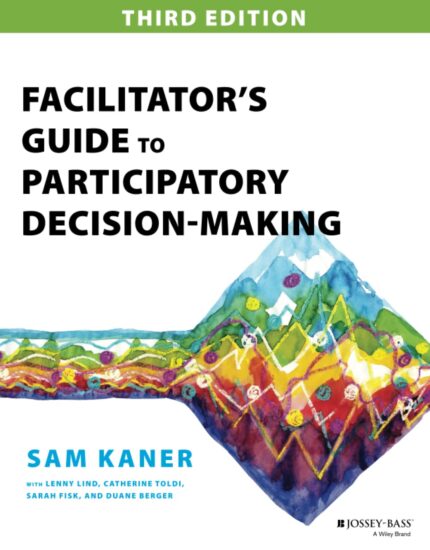
Sam Kaner’s Facilitator’s Guide to Participatory Decision-Making is a foundational book for any facilitator working in collaborative environments. It provides a clear framework for leading groups through complex decision-making processes and ensures that every voice is heard. This is a must-read for those working on group facilitation.
This book is great when you need to guide participants toward collective decisions, I liked how Sam Kaner distilled this into a simple framework to help groups navigate discussions and arrive at decisions that everyone can buy into.
Three Takeaways from Facilitator’s Guide to Participatory Decision-Making:
- Inclusive Decision-Making: Learn how to guide groups through a participatory decision-making process where everyone’s input is valued.
- Conflict Resolution: Discover techniques for managing disagreements and turning conflict into productive conversations.
- Alignment Building: The book offers a framework to guide groups toward alignment, even when tackling tough decisions.
A Key Message from Facilitator’s Guide to Participatory Decision-Making:
“The role of the facilitator is to create an environment where every voice is valued, and every decision is owned by the group.”
Get Facilitator’s Guide to Participatory Decision-Making here.
3. The 2-Hour Workshop Blueprint: Design & Deliver Workshops That Work Every Time by Leanne Hughes
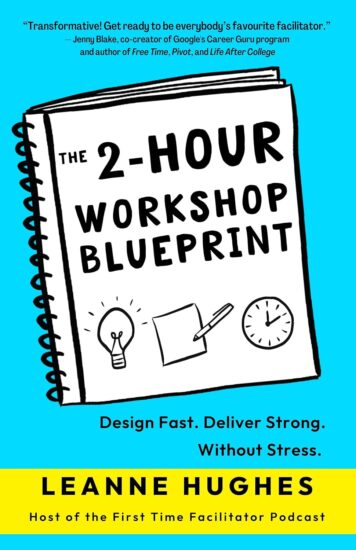
Leanne Hughes’ The 2-Hour Workshop Blueprint is a practical guide to delivering focused, high-impact workshops in just two hours. You can use this blueprint for a variety of workshops, whether you’re training teams on data analysis, teaching marketing techniques, or even running a session on creating a dog-grooming business. It’s perfect for facilitators who want to showcase their expertise and engage their audience with meaningful content.
However, it’s important to note that this book isn’t geared toward process-driven workshops like strategy sessions or design sprints. While some of the preparation and delivery tips could be useful in those contexts, the main focus here is on content-based workshops that connect with an audience and provide value in a short time frame.
Three Takeaways from The 2-Hour Workshop Blueprint:
- Design for Time Efficiency: Learn how to create meaningful, high-value workshops that deliver results in just two hours.
- Engagement Strategies: Hughes provides actionable methods to ensure participants stay engaged and energized throughout your workshop.
- Practical Templates: The book includes templates and frameworks that take the guesswork out of workshop planning.
A Key Message from The 2-Hour Workshop Blueprint:
“Workshops are about energy and momentum. You don’t need a whole day to make an impact—you need focus and structure.”
Get The 2-Hour Workshop Blueprint here.
4. The Workshop Survival Guide: How to Design and Teach Educational Workshops that Work Every Time by Rob Fitzpatrick and Devin Hunt
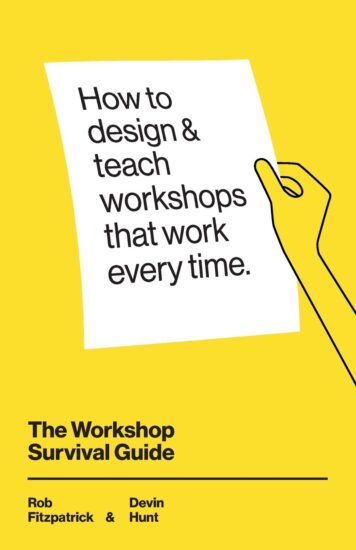
The Workshop Survival Guide is a practical manual for designing educational workshops that consistently deliver results. The authors cover an end-to-end approach, from planning to delivery, making this an essential guide for facilitators looking to improve their craft.
This book is full of practical advice. I’ve found that even though it focuses on educational settings, the methods for structuring content and keeping participants engaged are universally useful. It’s a great go-to for facilitators at any level.
Three Takeaways from The Workshop Survival Guide:
- Outcome-Oriented Design: Learn how to design workshops with clear learning objectives and actionable results.
- Participant-Centric Approach: The book emphasizes keeping participants at the center of your planning to ensure engagement.
- Practical Tools: Includes templates and checklists to help streamline the design and delivery of your workshop.
A Key Message from The Workshop Survival Guide:
“Your workshop’s success is determined by whether your participants leave with real, actionable insights—not just what you delivered.”
Get The Workshop Survival Guide here.
5. Holding Space: A Guide to Mindful Facilitation by Kate Ebner & Izzy Martens
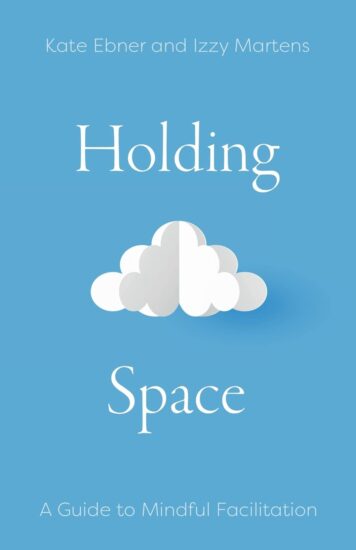
Holding Space brings mindfulness into facilitation, teaching you how to create a space where participants feel safe, heard, and fully engaged. The book focuses on the emotional and psychological aspects of facilitation, emphasising the importance of presence, trust, and openness.
As someone who practices mindfulness regularly, I found this book incredibly grounding before heading into a workshop. I’ve used some of book’s techniques, like starting sessions with the questions “How do you feel? What do you need? What do you choose?”—and they really helped me and my participants arrive fully and be present.
Three Takeaways from Holding Space:
- Mindful Presence: Learn how to use mindfulness to create a calm, open environment for deeper group discussions.
- Emotional Intelligence: Fenton provides tools for reading and responding to the emotional dynamics in a group.
- Building Trust: The book focuses on building trust within the group, helping participants feel comfortable sharing their perspectives.
A Key Message from Holding Space:
“Facilitation isn’t just about guiding a conversation. It’s about holding a space where people feel safe enough to show up as their true selves.”
6. Gamestorming: A Playbook for Innovators, Rulebreakers, and Changemakers by Dave Gray, Sunni Brown, and James Macanufo
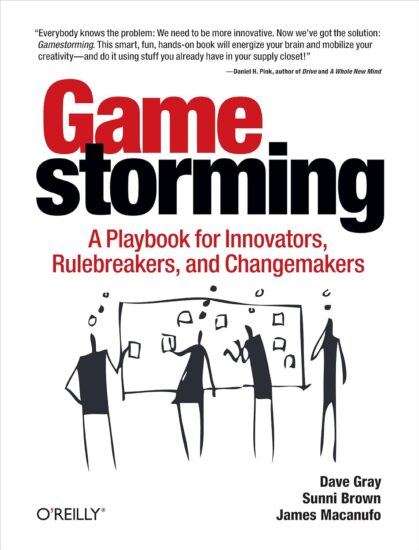
Gamestorming offers over 80 games and activities that help facilitators break down barriers, foster creativity, and generate new ideas. It’s a go-to resource for anyone looking to make workshops more interactive.
At first, I thought Gamestorming was just another book on brainstorming techniques, but it turned out to be so much more. The book’s focus on using games to foster creativity and collaboration has been interesting for me. I’ve learned new types of exercises that I can run in my workshops such as the Fishbowl and Do, Redo & Undo activities.
Three Takeaways from Gamestorming:
- Open-Minded: The book offers activities that help you break down complex problems and approach them from new perspectives.
- Innovative Team Engagement: You’ll find exercises that help foster collaboration and bring out the creative potential in any group.
- Versatile Toolkit: The games are adaptable, making them useful for any type of workshop, whether you’re innovating, planning, or problem-solving.
A Key Message from Gamestorming:
“To enter into a game is to enter another kind of space where the rules of ordinary life are temporarily suspended and replaced with the rules of the game.”
7. The Icebreaker Playbook: Facilitator’s Top Prompts to Warm Up Your Workshops & Encourage Teamwork (with 100+ Effective Icebreaker Questions) by Guerric de Ternay
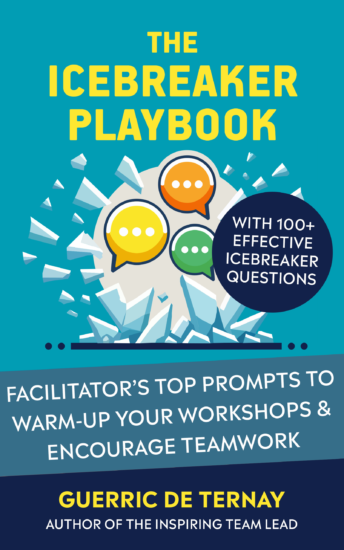
When I wrote The Icebreaker Playbook, my goal was simple: to give facilitators a practical toolkit for breaking the ice and setting the tone for an interactive and engaging workshop. After years of running workshops, I realized that the way you start a session can make or break the group’s dynamic. If participants feel comfortable and connected from the get-go, they’re far more likely to open up, collaborate, and contribute meaningfully throughout the workshop.
The book is packed with over 100 icebreaker questions designed to spark conversation, break down barriers, and engage participants right from the start. Whether you’re running a lighthearted team-building exercise or tackling deeper topics, these prompts are versatile and adaptable for any setting. I wanted facilitators to have a resource they could rely on, no matter the context, to get people talking and build trust early in the session.
Three Takeaways from The Icebreaker Playbook:
- Boost Engagement from the Start: The right icebreaker can transform the energy in the room, making participants feel comfortable and engaged within minutes.
- Versatile for Any Workshop: The questions in the book can be adapted for a variety of workshop styles, whether you need a fun warm-up or a more thoughtful, reflective opener.
- Encourage Participation: Icebreakers create a sense of connection among participants, breaking down social barriers and making it easier for everyone to contribute and collaborate.
A Key Message from The Icebreaker Playbook:
“A great icebreaker transforms strangers into collaborators in minutes, setting the tone for a productive and enjoyable workshop.”